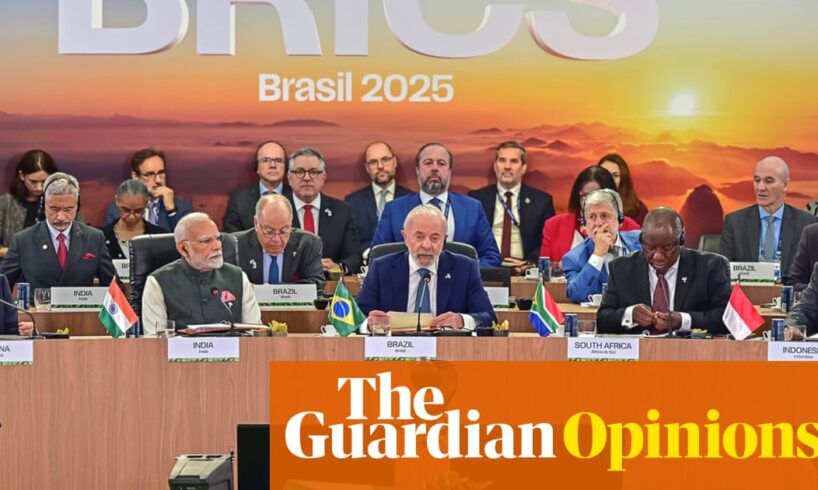
The Brics summit in Brazil last week revealed a loose alliance of emerging powers becoming more complex – and perhaps more consequential. For Brics, heft matters. It now counts 11 member states – including Indonesia, which joined this year – representing half the world’s population and 40% of the global economy, outpacing the G7 by $20tn.
Yet its size hides its contradictions. The grouping’s call for more inclusive global institutions sounds welcome, but there is a preponderance of autocracies within its own ranks. Brics is right that international law should be upheld in Middle Eastern conflicts. But it climbs down from its moral pedestal by condemning Ukraine’s strikes on Russian infrastructure – while staying silent on Moscow’s relentless attacks on civilians.
The acronym “Bric” – Brazil, Russia, India and China (South Africa wouldn’t join until 2010) – began as a Wall Street bet on rising powers challenging the west. But what defines Brics today is a subtler, more strategic ambition: to insulate themselves from Washington’s gravitational pull while cooperating to build a joint hi-tech industrial base. There are things that the Brics get right. Financial global institutions such as the International Monetary Fund are in need of reform; the rich world has failed to honour climate finance promises. The group’s understandable response in the face of inaction is to create its own development bank to promote a form of green industrialisation.
A pre-summit agreement on a formal collective Brics stance on funding climate action will help. Rapid growth in renewable energy means fossil fuels now account for less than half of the bloc’s total electricity generation. Given the climate emergency, such progress can only be welcome. Brics member states now lead in green tech and boast booming consumer markets – offering both the tools and the scale to drive industrial growth.
The postwar order stood on three pillars: US dominance, hydrocarbons and open trade. Today, all three are cracking, largely because of the US itself. Many Brics nations have little to gain from backing oil when the world’s biggest producer is the US. Donald Trump’s threat of higher import duties on the bloc’s members speaks to the US turn against global trade. By placing tariffs on Brazil over its internal politics, Mr Trump turns economic diplomacy into personal vendetta – and highlights how the rules-based order is unravelling.
This moment presents both a challenge and an opening. Tariffed in the west, Chinese firms pivot to Brics. So the United Arab Emirates cashes in – winning local production and tech transfers from Beijing that the west won’t permit. Brics’ vision of smart, clean growth fits the gaps in the global order. But it isn’t united: Russia’s green potential is buried under its fossil fuel policy. Saudi Arabia hedges – flirting with Brics while clinging to the US, with deals in the balance. Most of the group’s member states are nervous that a powerful China could tower over the rest. Strikingly, however, its leader, Xi Jinping, did not attend this summit.
The Brics nations can still close ranks. Their most technical yet revealing move is to start building financial “plumbing” to bypass western systems. The group isn’t ditching the dollar – but its members know what exclusion feels like: India had credit denied after the 2008 crash; Iranian banks have been sanctioned since 2012. The bloc’s success will depend not just on ambition, but on the capacity to coordinate across national interests.
Do you have an opinion on the issues raised in this article? If you would like to submit a response of up to 300 words by email to be considered for publication in our letters section, please click here.





